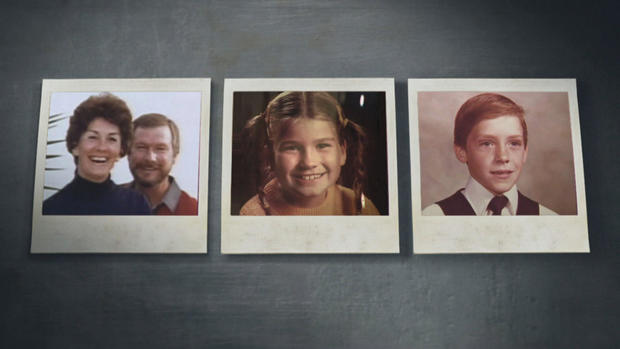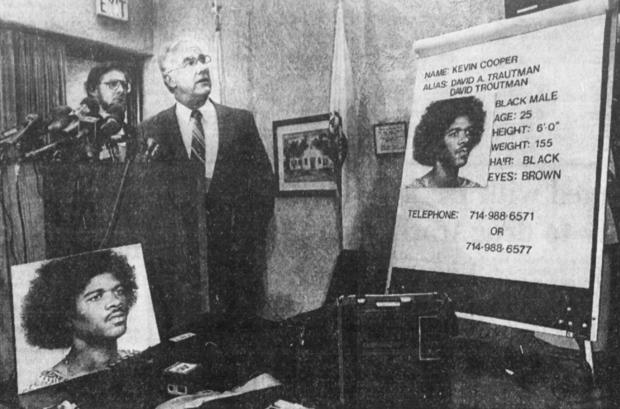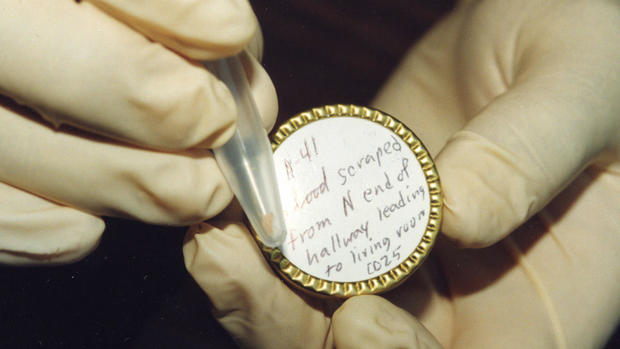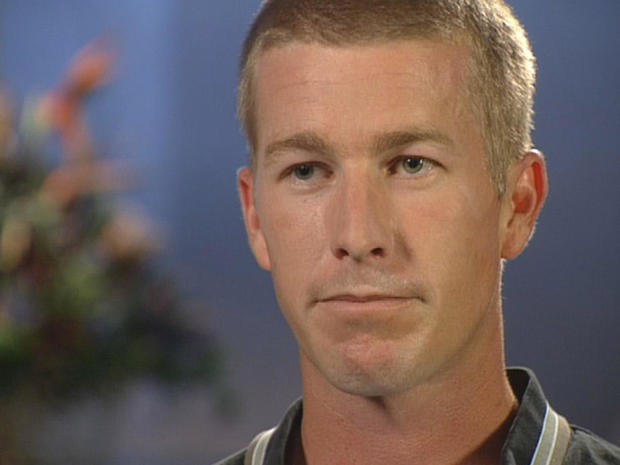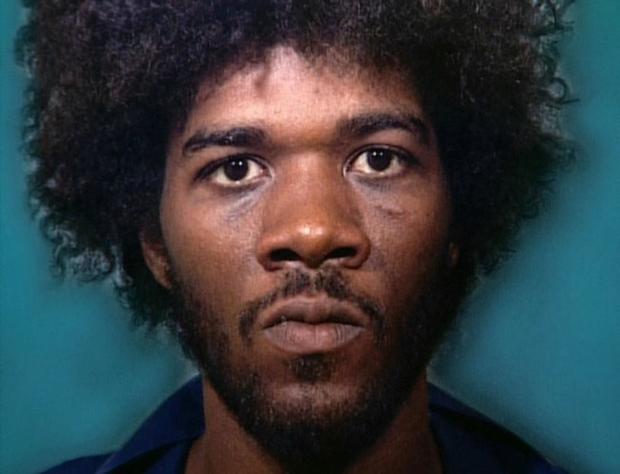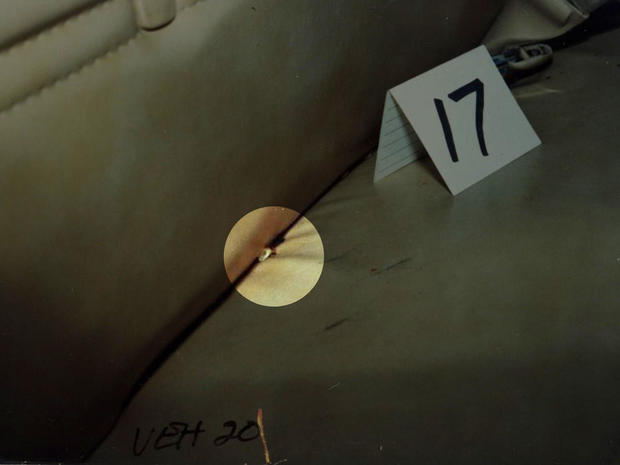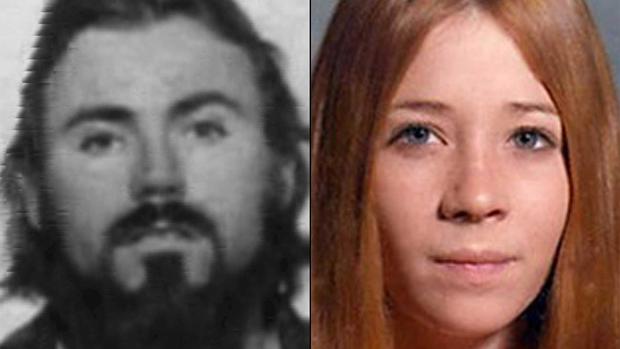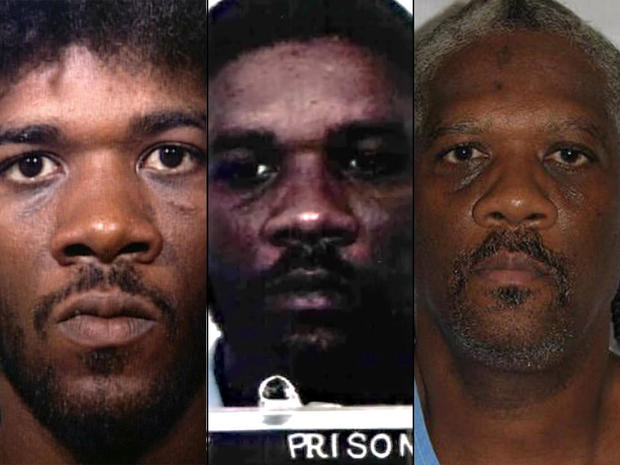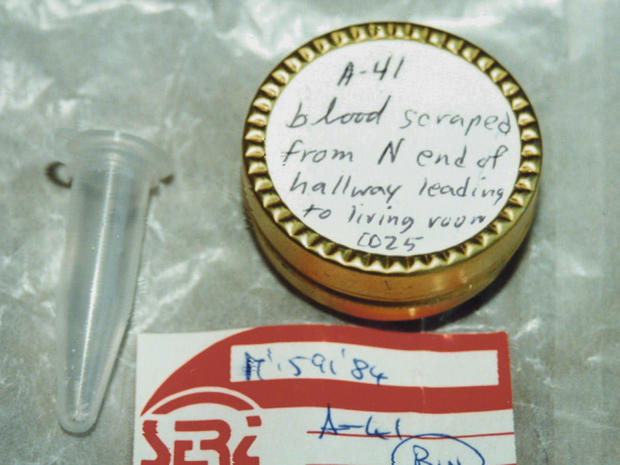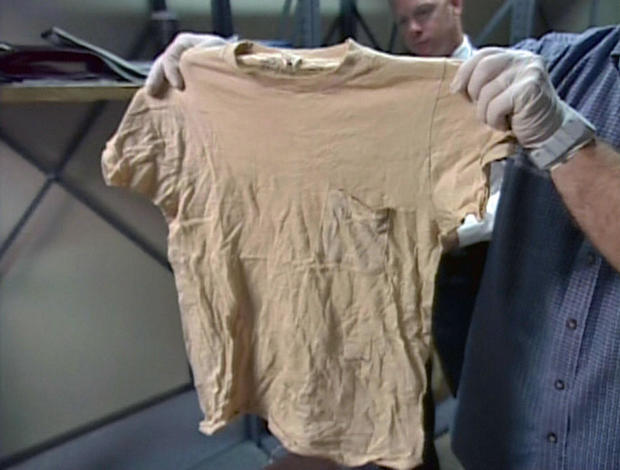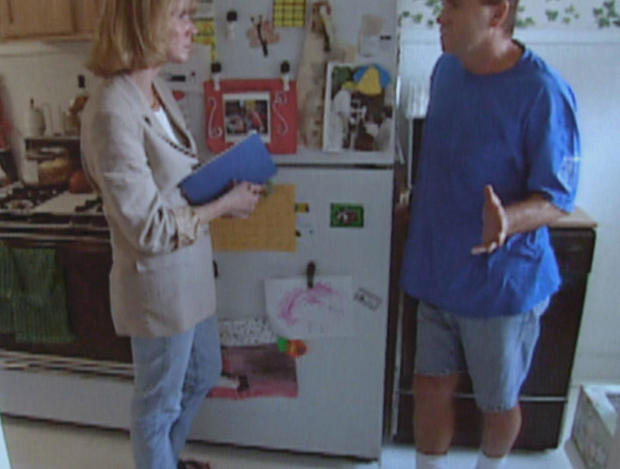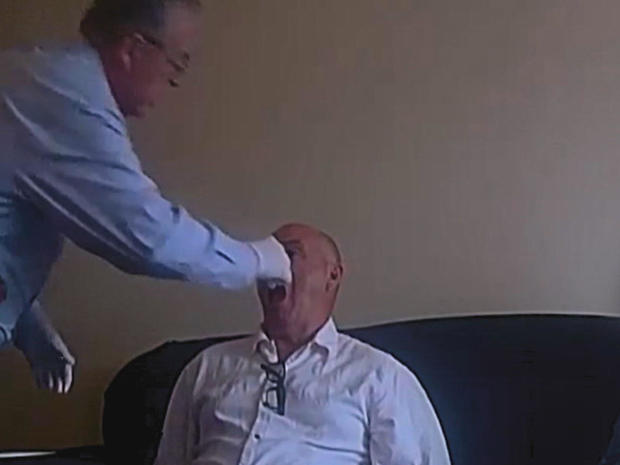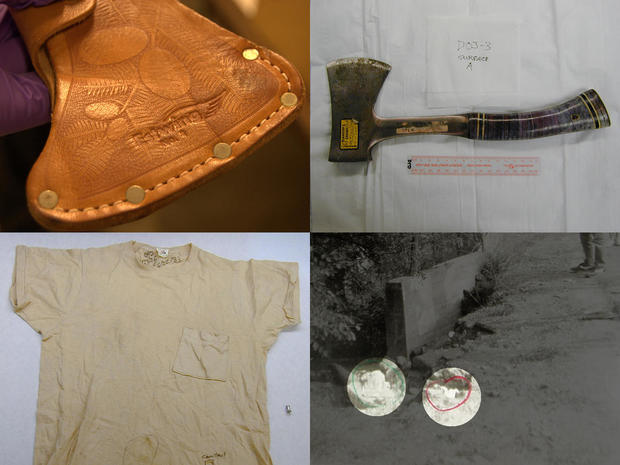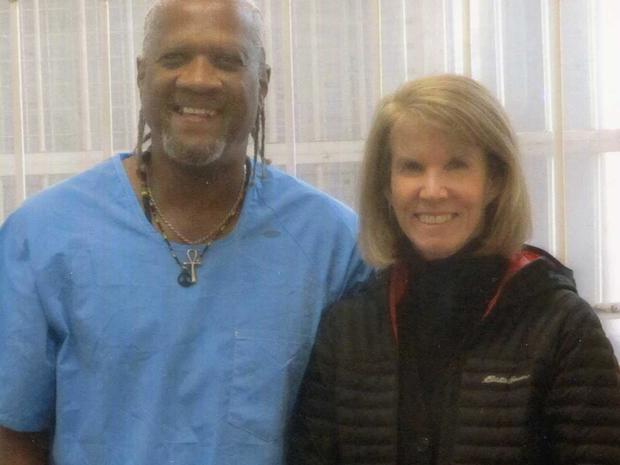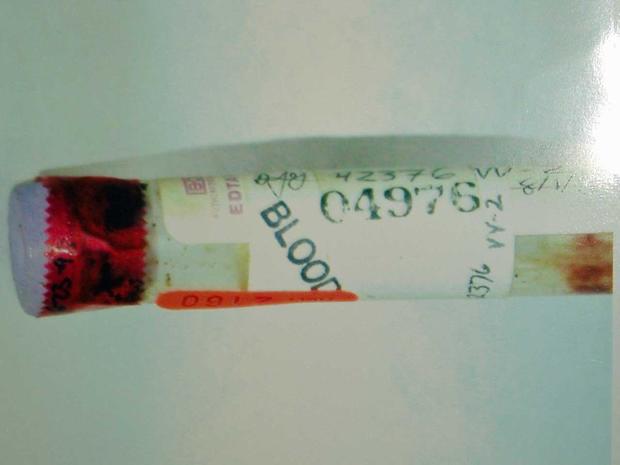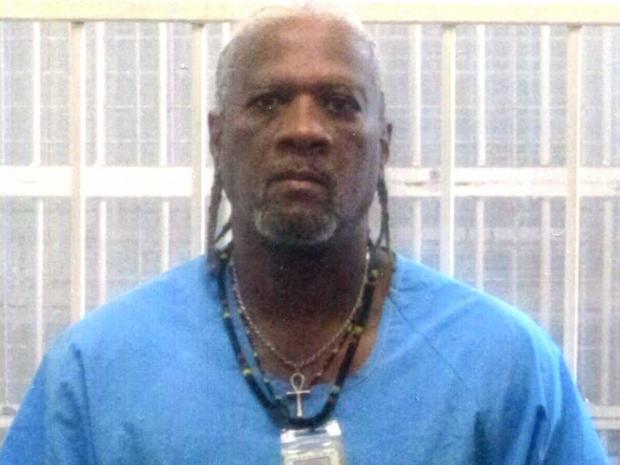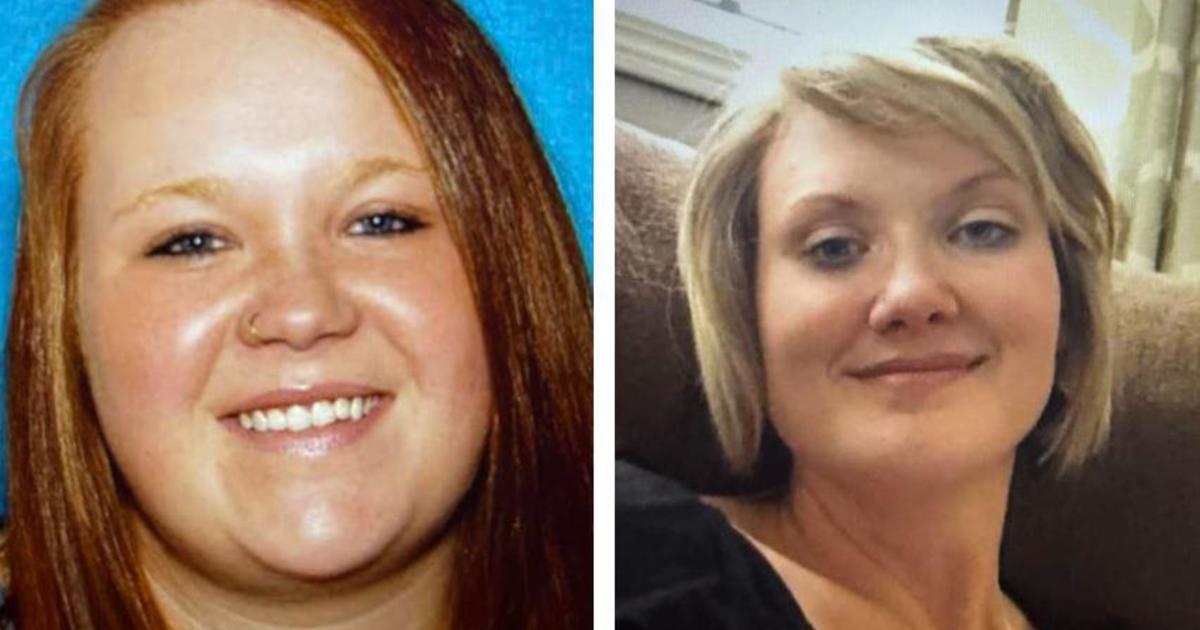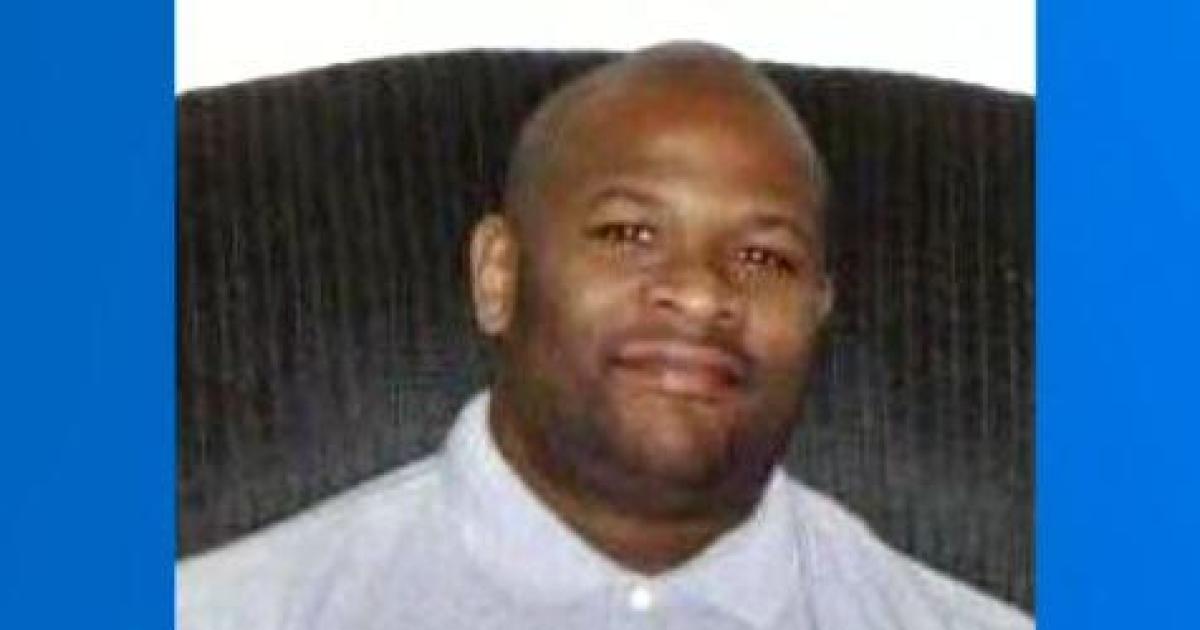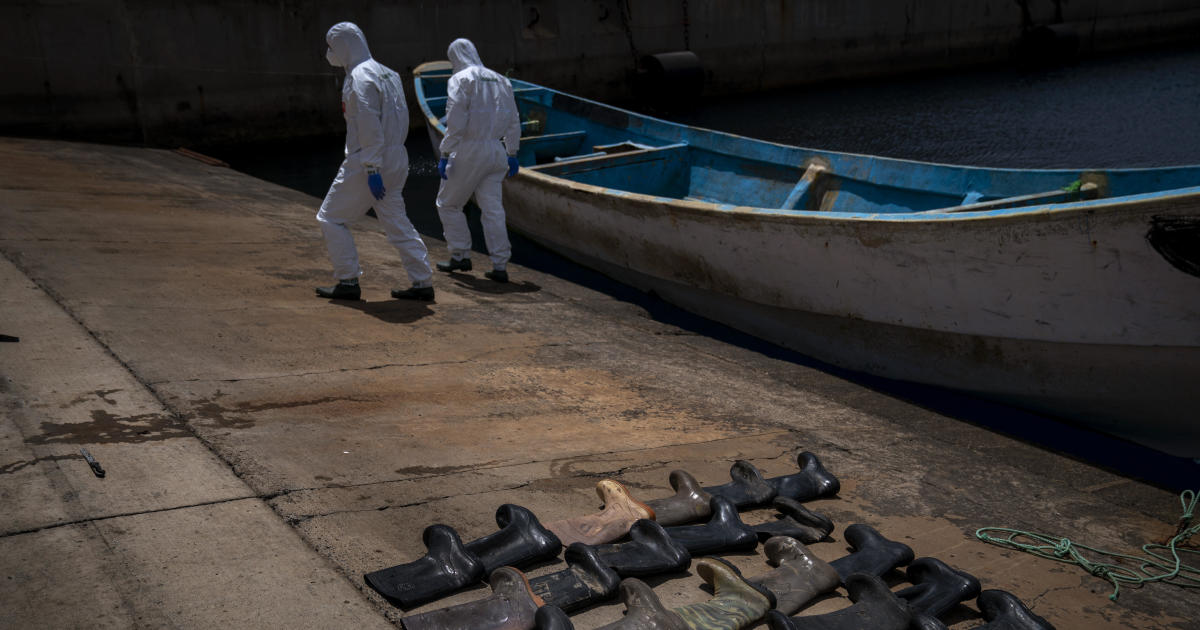Kevin Cooper case: Could new developments help death row inmate's bid for freedom?
[This story previously aired on March 21, 2020. It was updated on July 24, 2021.]
For two decades, "48 Hours" has investigated the case of Kevin Cooper, the California death row inmate who has always claimed innocence. Our investigation began with letters sent by Cooper from San Quentin State Prison outside San Francisco. Cooper claimed he'd been framed for the murder of four people in a horrific home invasion in Chino Hills, California, in 1983.
In May 2019, for the first time, Moriarty visited Cooper at San Quentin. His case has drawn international attention from the likes of Pope Francis and Kim Kardashian West.
Cooper has maintained for more than three decades he did not kill Doug and Peggy Ryen; their daughter, Jessica, 10; and a family friend, Christopher Hughes, 11.
"I die a little bit every day. The only thing that keeps me going is I know I'm innocent," Cooper told Moriarty.
Now, with new witnesses, lost evidence and a DNA test that doesn't link him to the crime, the question remains: will Cooper ever walk free again?
MASSACRE IN CHINO HILLS
It was a massacre, brutal and bloody, and more than three decades ago, it shattered the upscale horse community known as Chino Hills in Southern California. Many wondered back then if the right man had been convicted for the crime, and even more wonder today if the real killers got away.
On June 4, 1983, Peggy Ryen, her husband Doug, and their 10-year-old daughter Jessica were stabbed and slashed to death inside their home. An 11-year-old neighbor spending the night, Christopher Hughes, also lost his life.
DEPUTY: There are 4 DOAs.
911 OPERATOR: One subject is still alive.
The only one who miraculously lived through that night was Josh Ryen, then 8-and- half years old. Erin Moriarty spoke to him in 2003.
Erin Moriarty: What does something like this do to a person's life
Josh Ryen: Changes your life. … You lose somebody … and it hurts.
There was strong evidence pointing to multiple assailants. A bloody hatchet was discovered near the Ryen's Arabian horse ranch. Investigators believed it was just one of three weapons used. And according to the coroner, the victims had some 140 wounds.
NEWS REPORT: The Ryens' family car is missing and presumed taken by the murder suspects.
SHERIFF FLOYD TIDWELL [to reporters]: It's a 1977 Buick. Four door, station wagon.
Neighbors reported they saw multiple people drive away in a car that looked like it. And Josh, still too wounded to speak, also indicated that there were three attackers when he was questioned by a deputy.
Deputy Sheriff Sharp: When we got to the point of asking him how many people were there, I went "one, two, three," and he squeezed my hand.
Erin Moriarty: Three people when things went crazy.
Deputy Sheriff Sharp: Yeah, right.
Josh thought the attackers were white or Mexican men, and yet, police soon zeroed in on one man, Kevin Cooper.
NEWS REPORT: The prime suspect, escaped prisoner Kevin Cooper, is still at large.
Cooper was a career burglar who'd escaped from nearby prison and was on the run. He had been hiding out at a vacant house near the Ryen home before the murders.
A hatchet was reported missing and a hatchet sheath was later recovered there.
NEWS REPORT: A huge manhunt was finally over, with Cooper being sly enough to evade them for months.
By the time Cooper went on trial, the memory of the only eyewitness, Josh Ryen — then 10 — had changed. The district attorney at the time, Dennis Kottmeier, questioned Josh:
D.A. DENNIS KOTTMEIER: What did you see?
JOSH RYEN: I don't know, but like I saw almost like a shadow or something.
He no longer remembered three attackers:
D.A. DENNIS KOTTMEIER: How many shadows did you see?
JOSH RYEN: Just one.
D.A. DENNIS KOTTMEIER: Just the one?
COURT CLERK: We the jury of the above entitled cause, determine that the penalty shall be death.
Kevin Cooper was convicted and condemned to die, although he told the jury then what he later told Moriarty: that he was innocent.
Erin Moriarty: Why should someone believe you Kevin?
Kevin Cooper: I'm not asking anyone to believe me. I'm asking people to look at the evidence.
And the evidence does raise questions. Cooper's fingerprints weren't found anywhere at the crime scene. Neither were any of his hairs. But there were strands of light-colored hairs found clutched in Jessica Ryen's hand. Her grandmother Mary Howell.
Mary Howell: When I saw … that little hand. 'Cause she musta fought terribly.
And, there were those multiple weapons that authorities say were used in the attack. How could one man wield at least three weapons?
Mary Howell: I still can't believe that one person … could do all that to my family. There's five of them, and I just know that they didn't stand in line saying, "I'm next."
The scene was incredibly bloody. There was spatter all over the walls. And yet, the state's expert said he found only one single drop of blood that matched Cooper's blood type. It is on the tiny paint chip seen in the evidence photo shown above.
NEWS REPORT: A man walking his dog spotted the Ryen car in a church parking lot yesterday morning.
And then there's the stolen family station wagon. Authorities believed Cooper killed the Ryen's to steal it.
NEWS REPORT: Police eagerly searched the car for clues.
Blood was found in the car, but if Kevin Cooper used it to get away, why was the blood found on three seats — not one?
Mary Howell believed there had to be more than one killer.
Mary Howell: And if somebody's out there that thinks that maybe Josh could …identify him, if they went after Josh they'd go after me too. … I'm concerned. … I'm a protective grandmother.
After "48 Hours"' first report on Cooper's case aired, the state agreed to conduct DNA tests. There wasn't enough DNA in the hairs, but cigarette butts found in the car, a tan T-shirt found near the scene, and that tiny blood-stained paint chip were all sent to the lab. In 2002, the results came in, and no one seemed more shocked than Cooper. The evidence tested positive for his DNA.
Kevin Cooper [phone call with Erin Moriarty]: It was devastating. I mean, I 'm not going to lie to you. I thought I was going to walk out the door …
Cooper was convinced that somehow investigators had tampered with and planted the evidence, but who would believe him? Not Josh Ryen.
Josh Ryen: It's time to face it. And the DNA's pointing to Kevin Cooper. So, he was there. He needs to pay for his crime, so we have closure.
Christopher Hughes' mother agreed, but Josh's loving and protective grandmother, didn't see it that way.
Mary Howell: I haven't changed … my opinions at all. … I still am looking for the truth. … I feel … the killers are still out there somewhere.
Kevin Cooper was scheduled to die by lethal injection on February 10, 2004.
Erin Moriarty: Would you go watch him die?
Josh Ryen: Yes.
Erin Moriarty: You would need to do that?
Josh Ryen: Yes … He was there … So, he needs to pay for that.
Erin Moriarty: If Kevin Cooper is executed, you believe they'll be killing an innocent man
Mary Howell: Yes, I do.
A SECOND CHANCE
In February 10, 2004, Kevin Cooper's date with death was set. Then, with just hours to go …
NEWS REPORT: The execution that was supposed to happen a few hours ago is now on hold.
NEWS REPORT: A surprise ruling late tonight that stayed his execution and stunned just about everybody.
The 9th Circuit Federal Appellate Court stepped in and saved Cooper's life. He later described that moment to Moriarty.
Erin Moriarty: How close did you come?
Kevin Cooper: I came within three hours and 42 minutes of being strapped down to that gurney and physically tortured with lethal poison.
After the court stayed his execution, attorney Norman Hile, working pro bono, joined Cooper's defense.
Norman Hile: I think Kevin is innocent. And I also think that he was the victim of a horribly racist prosecution. And I just don't give up.
Hile fought to get Cooper a new trial. For years, he petitioned court after court, and the boxes of legal documents continued to pile up. Mary Howell still refused to say it was over.
Mary Howell: Everybody knows that I wanna know the truth … why my family was killed. Who did it? Why? … and I don't want to die without knowing it.
Sadly, the 93-year-old grandmother never got the answers she hoped for. In 2008, Mary Howell died. Kevin Cooper had been on death row for 23 years.
One year later, Cooper finally got a break. His case was back in front of the 9th Circuit Court with 27 judges. While the majority refused to review his case, 11 of them disagreed.
Norman Hile: There is not a single case in U.S. history where 11 appellate judges said that they felt that the person had not gotten a fair hearing.
One judge, William Fletcher, wrote in a scathing 100-page dissent, "the state of California may be about to execute an innocent man" and "there is substantial evidence that three white men, rather than Cooper were the killers."
In a lecture, he pointed to contradictions in the only survivor's account. Josh Ryen first indicated the assailants were three white or Mexican men. By trial, his story was different:
JOSH RYEN: I only saw like a shadow or something.
D.A. DENNIS KOTTMEIER: How many shadows did you see?
JOSH RYEN: Just one.
D.A. DENNIS KOTTMEIER: Just the one?
Judge Fletcher believes Josh's memory was influenced by a deputy who had visited Josh "approximately 20 times" during the hospital stay.
JUDGE WILLIAM FLETCHER [NYU Lecture]: the deputy got Josh to change his story so that he no longer said three to four white men did it.
The judge also noted Josh never identified Kevin Cooper.
JUDGE WILLIAM FLETCHER [NYU Lecture]: During his stay in the hospital, Josh twice saw a picture of Cooper on television both times he said Cooper was not one of the killers.
It's what Cooper's lawyers have been saying all along.
Norman Hile: As soon as they identified Kevin Cooper, a black escaped prisoner, in the house down the hill from the Ryens, they stopped looking for those people, and focused entirely on … proving that Kevin Cooper had killed the Ryens.
D.A DENNIS KOTTMEIER [in court]: Repeatedly attacked with hatchet blows to the head by Kevin Cooper.
Judge Fletcher also questions the key piece of evidence in this case — that tiny drop of blood. The state says proves Kevin Cooper was inside the Ryen home. At first, the criminalist said it was one blood type and later he said it was another.
Norman Hile: When he found out that he'd put the wrong blood type down, and he had not matched it to Kevin, he changed his notes to say it was the same blood type as Kevin's
The judge says the criminalist "altered his lab notes and claimed that he had misinterpreted his results". And that's not all. Remember those cigarette butts found in the Ryen's station wagon? Defense attorney Norman Hile believes they came from the home where Cooper had been hiding out.
Norman Hile: When they found the Ryen's station wagon they planted those two cigarette butts …
Those butts weren't found until sheriff's deputies did a second search of the car, and according to Hile, one of the butts inexplicably grew from one test to another.
Norman Hile: The previous tested – cigarette butt … was 4 millimeters long … and the one … in 2002 was 7 … millimeters long.
Judge Fletcher says deputies "discounted, disregarded and discarded evidence pointing to other killers …" like evidence provided by Diana Roper. Days after the murders, she called the sheriff's office after she found bloody coveralls left in her closet.
Diana Roper: I tried to tell them that this has to do with the Chino murder.
She said they belonged to her ex-boyfriend, a paroled killer by the name of Lee Furrow. Furrow had murdered 17-year-old Mary Sue Kitts. On the orders of a gang leader, he strangled her and threw her off a bridge into a river.
Diana Roper: Just an evil, evil person.
Roper said she told investigators that Furrow also owned a hatchet that looked like the weapon used on the Ryens and Christopher Hughes.
Diana Roper: Well he kept all his tools on the back porch, hanging on nails … and as soon as they said, I walked back there, and his hatchet was the only thing missing.
And, she said, on the day of the murders, Furrow was wearing a T-shirt.
Diana Roper: It was like a beige, light brown colored beige.
A tan shirt was found down the road from the Ryen's home, not far from the Canyon Corral Bar.
That is significant because on the night of the murders, three white men were seen in that bar – one of them in a light-colored T-shirt and another in bloody coveralls.
Christine Slonaker and Mary Wolfe, who were in the bar, spoke to "48 Hours" in 2004.
Christine Slonaker: I realized at that time that he was just covered in blood, spattered in blood.
Mary Wolfe: It was spotted. He had a light-colored shirt on so it really, I mean it really showed, even though the bar was still dark you could still see it.
Erin Moriarty: When you first heard that the Ryens had been murdered, what was your first thought?
Christine Slonaker: The guys in the bar …
Diana Roper died three years after "48 Hours" interviewed her. The bloody coveralls she turned over to the authorities were never tested. Instead, a deputy threw them out before Cooper's trial. A "disposition report" shows the coveralls were "destroyed" and described as having "no value."
Floyd Tidwell: I don't know that that happened.
Erin Moriarty: That did happen.
In 2000, when "48 Hours" spoke with Floyd Tidwell, who was the sheriff at the time of the murders, he didn't seem to know anything about it. Tidwell died in February 2020.
Erin Moriarty: But doesn't that concern you that maybe not all the evidence was available at Cooper's trial?
Floyd Tidwell: Not on — I can't be concerned unless I know about it.
Erin Moriarty: But it was something that happened when you were sheriff. It was your sheriff's department.
Floyd Tidwell: Hey, let's bring this to a screaming halt right here, OK.
Erin Moriarty: Oh.
Floyd Tidwell: That's enough of that crap [walks off camera and rips off his microphone].
Kevin Cooper believes the coveralls could have helped his case, and so does Judge Fletcher.
JUDGE WILLIAM FLETCHER [NYU Lecture]: The bloody overalls were, to say the least, inconvenient, so the deputies threw them away … Kevin Cooper, the man now sitting on death row, may well be – and in my view, probably is — innocent.
Erin Moriarty: Doesn't that give you pause? Doesn't that make you feel that you have to do whatever you can to make sure that the right person's being executed?
Michael Ramos: The right person is being executed.
Former District Attorney Michael Ramos inherited Cooper's case in 2003.
Michael Ramos: It doesn't give me pause at all —
Erin Moriarty: How do you dismiss —
Michael Ramos: Because we're talking about a dissenting judge of the 9th Circuit, uh, Judge's Court of Appeals and which is, uh, federal, you know, with all due respect, a very liberal Circuit. … the majority opinion was not only guilty … overwhelmingly guilty.
WAS EVIDENCE PLANTED?
By 2010, Kevin Cooper, 52, had been on death row nearly half his life. His appeals had run out. Then, a newspaper columnist 3,000 miles away took notice.
Nicholas Kristof writes op-ed columns for the New York Times. What caught his attention was Judge William Fletcher's dissent.
Nicholas Kristof: I had never read an opinion like this with a respected circuit court judge arguing that somebody on death row had been framed…
Kristof is a Pulitzer Prize winning writer covering genocide and human rights issues and there was something about Kevin Cooper's case that struck a chord.
Nicholas Kristof: Prosecutors kinda seized upon him as — that, you know, he's sent by central casting. He looks the part that people had in their minds for a ruthless killer.
Nicholas Kristof: And it is particularly — problematic when a black person is charged with the killings of a white person. Or, in this case, white people …and I think that made it a lot harder for Kevin Cooper to be tried fairly for this crime.
Kristof and a team from the Times closely examined the evidence the state said tested positive for Cooper's blood in 2002: the tiny blood-stained paint chip and the tan T-shirt. Kristof's conclusion?
Erin Moriarty: You believe, as you're sitting here right now, that there was evidence planted?
Nicholas Kristof: I believe that there was evidence planted.
But if that's true, how did Cooper's DNA get on those items? Defense attorney Norman Hile has a theory.
Norman Hile: When Kevin Cooper was arrested … they took … blood from him ... And that's the blood they could have used.
And according to court documents, before the DNA tests were done, a glassine envelope which contained the paint chip was checked out overnight — signed out to the same criminalist who had matched the blood on it to Cooper. His reason? He said it was to assure there was enough evidence to test.
Erin Moriarty: Kevin, what do you believe happened when he took …the single drop of blood that they say connects you to the case?
Kevin Cooper: I think he put either my salvia or blood in there. Or something in there. He had it out for 24 hours. … And you only sign it and date it when you open the container.
Erin Moriarty: And the date is on there. You know, I've seen the picture.
Kevin Cooper: Yes … and so that means he opened it … but why did he take it out the vault?
As for the T-shirt, a judge who held a hearing on evidence tampering after the DNA tests determined that "The shirt … had not been checked out or looked at by anyone prior … to DNA testing …"
But that's not accurate. The state showed "48 Hours" the T-shirt a year before the DNA tests were done — when"48 Hours" first started looking at the case.
Erin Moriarty [with T-shirt in 2000]: If you were gonna test this shirt here, you would test it for what?
William "Bill" McGuigan | Former Cooper defense team member: To see if there's any DNA there that can be tested.
Later, the defense discovered something alarming about that vial of Cooper's blood the state had taken for evidence. It was tainted.
Norman Hile: The vial that contains Kevin Cooper's blood has a second unidentified person's DNA … on it.
Kristof believes there is a suspicious pattern in Cooper's case.
Nicholas Kristof: I think this is unusual in the enormous amount of evidence that suggests that Kevin Cooper was framed, the way consistently a place would be searched, no evidence would be found and then once they knew they were looking at Kevin Cooper, then they would search again. And [snaps his fingers] abracadabra, they would find critical evidence that they needed against him.
Former District Attorney Michael Ramos says claims of evidence tampering have been dismissed by both state and federal courts.
Michael Ramos: As far as planting evidence, that's absolutely impossible. … There was no evidence tampering at all.
Yet, after Cooper's conviction, key people who had worked the on the case got in trouble with the law. Crime lab director William Baird resigned amid allegations of stealing heroin from the property locker. Sheriff Floyd Tidwell was charged with a felony.
Norman Hile: Floyd Tidwell was found out … to have been taking guns that the sheriff's department deputies took from people during their normal police activities and sold them.
That's the same Sheriff Tidwell who didn't want to answer "48 Hours"' questions about destroying evidence: "Hey, let's bring this to a screaming halt right here, OK."
Nicholas Kristof: It does raise questions about the caliber of the work that was being done in the sheriff's office.
Both Cooper's defense team and Nicholas Kristof called for new DNA testing and got a huge response from readers, politicians, and even celebrities. Kim Kardashian West sent out a tweet: "Governor Brown, can you please test the DNA of Kevin Cooper?"
Erin Moriarty [phone interview]: What was your reaction when she actually went on social media saying you deserve to get testing?
Kevin Cooper: I was very thankful … that she cared enough and took the time out of her busy life to do that.
Erin Moriarty: I understand even the Pope responded?
Nicholas Kristof: The Pope weighed in. Yeah, how — how great is that?
Erin Moriarty: You saw the article written by Nicholas Kristof.
Michael Ramos: Right.
Erin Moriarty: Is he wrong?
Michael Ramos: Absolutely wrong … And I wish that he would've taken the time to go over the evidence. The evidence that was presented at the trial. The evidence that was presented to the appellate courts … the federal proceedings … I truly believe that he didn't do his homework before writing that one-sided, very one-sided story.
Nicholas Kristof: So, if you disagree with [laughs] my conclusions, then test the evidence … the best response, if you don't like my argument, is to prove me wrong with the evidence that is sitting in lockers and has been for 35 years.
The defense believes new tests will connect someone else to the murders, but they'll need the power of California's governor to make it happen.
WHO WORE THE TAN T-SHIRT?
Kevin Cooper's lawyers have long believed Lee Furrow was involved in the murders of the Ryen family and Christopher Hughes. When "48 Hours" found him in 2000, Furrow had moved cross country to Pennsylvania.
Lee Furrow: Here I am and I'm willing to talk to anybody
Furrow was a known killer. He had murdered a 17-year-old nearly a decade before the Chino Hills Massacre.
Lee Furrow: I've made mistakes in the past and I've paid for my mistakes.
Erin Moriarty: You consider killing just a mistake?
Lee Furrow: Yeah, it was a mistake.
Erin Moriarty: How did you kill her?
Lee Furrow [shakes his head no]: That's — you know, between me and the courts.
Erin Moriarty: According to testimony in the court, you strangled her. … Is that correct?
Lee Furrow: Yes.
Erin Moriarty: Can I ask you point blank, did you kill the Ryen family
Lee Furrow: No, I did not.
Erin Moriarty: Or Christopher Hughes
Lee Furrow: No, I did not. … I had nothing to do with any of this.
Moriarty asked Furrow about those bloody coveralls that his ex-girlfriend gave to authorities.
Lee Furrow: I never had any coveralls [shakes his head].
Furrow said that at the time of the murders, he had been at a concert
Michael Ramos | Former San Bernardino District Attorney: He was 30-plus miles away from the crime scene when this murder occurred.
In 2018, Furrow agreed to give Cooper's team a sample of his DNA.
Erin Moriarty: Were you surprised he was just willing to hand over his DNA?
Tom Parker | Defense investigator and retired F.B.I. agent: I was astonished that he would be willing to do that. And I asked him why and he said he really had nothing to hide.
Furrow is seen with a relative at a meeting that was secretly recorded by Investigator Parker:
TOM PARKER [WITH FURROW]: Would you mind opening up your mouth? I'll do this side here.
Furrow was willing to give his saliva, but not his blood.
LEE FURROW: I'm not doing blood work and end up on evidence like whatever they did to Kevin Cooper.
TOM PARKER: You never had a tan T-shirt like that?
LEE FURROW: No. Never.
TOM PARKER: That's not what you had on?
LEE FURROW: No.
TOM PARKER: OK, well DNA's gonna tell us … even 35 years later, those skin cells are still gonna be there.
LEE FURROW: Good
"48 Hours" went back to Furrow's door again in January 2019. This time he wouldn't talk to us.
While the defense team pushed for new DNA tests, the only survivor of the massacre was pushing back. Josh Ryen doesn't think any more DNA tests are needed to determine who killed his family in 1983. In a letter to Governor Brown, he wrote: "Kevin Cooper is on my mind every day. He is a nightmare which plays over and over in my head. I can never get away from him."
Christopher Hughes' mother Mary Ann agrees.
Mary Ann Hughes: There's just no doubt Kevin Cooper was the only one and the only killer and they need to carry out the sentence that he was given.
But Cooper, facing death, still insists he's innocent.
Kevin Cooper [on the phone with Moriarty]: I cannot take responsibility for murders I did not commit.
Then, in December 2018, Cooper got a surprise.
KCBS NEWS REPORT: Two weeks before leaving office, Governor Jerry Brown tonight has issued an executive order directing DNA testing carried out in one of the most shocking and brutal murder cases…
Erin Moriarty: How did you hear about it?
Kevin Cooper: I found out about it on Christmas morning when I was watching the news.
The governor's order allowed only four items to be tested: the hatchet, the tan t-shirt, an orange towel that was found next to it, and the hatchet sheath discovered in the house where Cooper was hiding.
Kevin Cooper: I'm just trying to stay positive and hopeful but I'm also skeptical.
Erin Moriarty: So, are these DNA tests really a matter of life or death?
Norman Hile: They are for Mr. Cooper, for sure.
But then, just two months later, Cooper got more good news. The new governor of California, Gavin Newsom, ordered more testing — including that vial of Cooper's blood.
Erin Moriarty: Why do you think Governor Newsom so quickly added the number of tests?
Norman Hile: Well, I like to think that it's because he saw in the clemency petition … that there was significant doubt about whether Kevin Cooper was guilty
Newsom also suspended executions in California. San Quentin's lethal injection facility was dismantled and hauled out of the prison.
But Kevin Cooper remains on death row.
Erin Moriarty: [Walking to visitor's center with Hile]: So, I'm finally getting to meet Kevin Cooper face to face after all these years.
In 2019, Moriarty went to San Quentin prison with attorney Norman Hile.
It was the first time she had seen Cooper in person. "48 Hours" was not allowed to record the visit, but we talked for hours. Even after all this time, Cooper is confident he will eventually walk out a free man.
Erin Moriarty: The fact that he could now have so much of the evidence tested, do you see a difference in Kevin?
Norman Hile: I think he's very cautious about really trying to predict what's going to happen and trying to get too optimistic … We're worried that something nefarious could happen and that the testing will not show his innocence
Kim Kardashian West also went to see Cooper and she shared her visit with her millions of followers.
Cooper continues to wait for the test results, but his team says they are not relying on that. They have new information, they say, that has nothing to do with DNA.
Norman Hile: We have the three people who have now testified under oath in a form of a declaration that Lee Furrow confessed to them …
A DISTURBING DISCOVERY
Kevin Cooper is 63 years old. He's now been on San Quentin's death row for more than half his life.
Kevin Cooper: I'm doing as best I can, despite my situation. I'm strong, mentally, emotionally, psychologically and spiritually. And I continue to fight.
It's been one disappointment after another in his bid to prove his innocence. And after a year of DNA testing, more disappointment.
Bicka Barlow: This evidence was collected years and years and years ago.
Defense attorney Bicka Barlow, a DNA specialist, says the tests confirmed her biggest fear: that the DNA is too degraded for even modern testing.
Bicka Barlow: … at the time, evidence wasn't handled very well. It wasn't stored well.
Erin Moriarty: Do you know as you are sitting here today who was wearing that t-shirt?
Bicka Barlow: No.
Erin Moriarty: And why not? … We know that this t-shirt was used in these murders. Why don't we know who was wearing it?
Bicka Barlow: We don't know for lots of reasons, but the DNA testing didn't tell us anything.
The lab was unable to find even one full DNA profile anywhere on the tan T-shirt that could be matched to a wearer.
Bicka Barlow: I'm sure for Kevin Cooper it is incredibly disappointing … you know maybe we would have gotten different results 10 years or 20 years ago, but that's not what happened.
It was much the same story for most of the other evidence.
Bicka Barlow: … testing was done on … the hatchet, the hatchet sheath, the fingernail scrapings from the victims, and we got no conclusive results.
Bicka Barlow [ pointing to iPad]: So, this is the orange towel that was found with the tan T-shirt
They had better luck with that orange towel – the one believed to have been taken from the Ryen home. A full DNA profile was found on the towel.
Bicka Barlow: We have a single male profile that is not Kevin Cooper's.
Barlow says the profile doesn't match Cooper or any of the victims, but it also doesn't match Lee Furrow. It was uploaded into CODIS, a national database of known offenders, but again there was no match.
Erin Moriarty: To be honest, this is a towel inside a family home, it could be a full profile of somebody who was visiting the Ryens.
Normal Hile: It could be all sorts of people.
Bicka Barlow: All of that blood had to go somewhere
There was one unexpected and disturbing discovery made during the testing.
Bicka Barlow: You look at all of these blood vials and they all have a substantial amount of blood in them.
But the vial that has contained Kevin Cooper's blood since he was arrested in 1983 is empty.
Bicka Barlow: … have an entire vial disappear like that raises all sorts of questions in my mind. … I can't understand how all that blood could have been consumed in testing.
Erin Moriarty: And when you say questions, what do you mean by that?
Bicka Barlow I don't know what to think … I know my questions are where did the blood go? Was it taken out deliberately and placed someplace else? There's so much evidence of bad behavior by the police in this investigation that frankly it wouldn't surprise me if somebody took blood from that vial and dropped it on things.
Cooper has always claimed that his blood had been planted.
Norman Hile: If you look at what we have so far, Kevin is not tied to these crimes through any of this testing.
Even without DNA tests that definitively tie someone else to the murders, Hile says he now has other evidence that does. The team found five new witnesses who connect Lee Furrow to the crime.
Tom Parker: We have found witnesses that in one case, Lee Furrow, confessed to shortly after the murders. Gave a detailed confession to this individual, who I'm sure he never would have believed would ever go to the police.
Two of those witnesses came forward after they watched "48 Hours"' broadcast. For now, they want to remain anonymous.
Erin Moriarty: What makes you believe these … men are credible? I mean how do you know they might not have a beef with him?
Tom Parker | Defense investigator: Obviously you don't take … confessions just at face value — you dig into them. Their backgrounds are such that contribute to their credibility.
One witness vividly recalled Furrow saying "we butchered all of them." And another witness gave details about Furrow's alleged accomplices that are shocking.
Tom Parker | Defense investigator: It was a surprise, quite frankly …
Tom Parker: We have statements from people that there were two women involved — on this killing team along with — Lee Furrow.
Erin Moriarty: But doesn't that contradict the witnesses at the Canyon Corral Bar — -they all said it was three men?
Tom Parker: Yeah, I have been told that at least one of the … women could have been mistaken for a man based on the clothing that was bein' worn.
Both women named by the new witnesses did hang out with Lee Furrow. Hile says he and his team are following this lead.
Norman Hile: Fewer than one out of five cases are solved by DNA testing. There's a lot of other ways in which people are exonerated, a lot of other ways in which the truth emerges.
Cooper's defense team asked — actually pleaded with — Governor Newsom to go beyond DNA tests and take a fresh look at Cooper's claims that evidence had been tampered with and planted. In a 152-page petition, they made a case for a full innocence investigation.
Erin Moriarty: Does this feel like a really tough, uphill battle?
Norman Hile: Always has [laughs].
Cooper is not giving up hope.
Kevin Cooper: I cannot give up … I will not give up.
On May 28, 2021, Governor Gavin Newsom ordered a comprehensive, independent investigation into the case of Kevin Cooper.
The investigation will review "the facts underlying the conviction" and "all available evidence" as well as Cooper's trial and subsequent appeals.
Produced by Marcelena Spencer, Lisa Freed and Dena Goldstein. Richard Barber and Gary Winter are the producer/editors. Gail Zimmerman is the senior producer. Nancy Kramer is the executive story editor. Judy Tygard is the executive producer.
